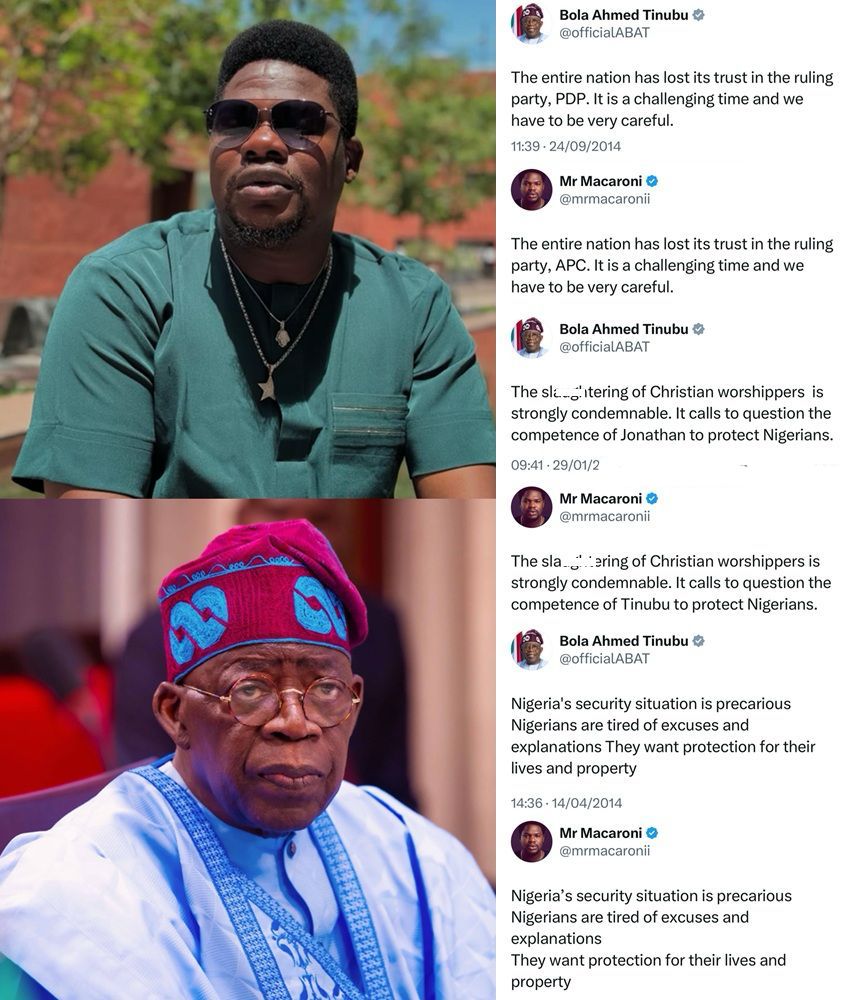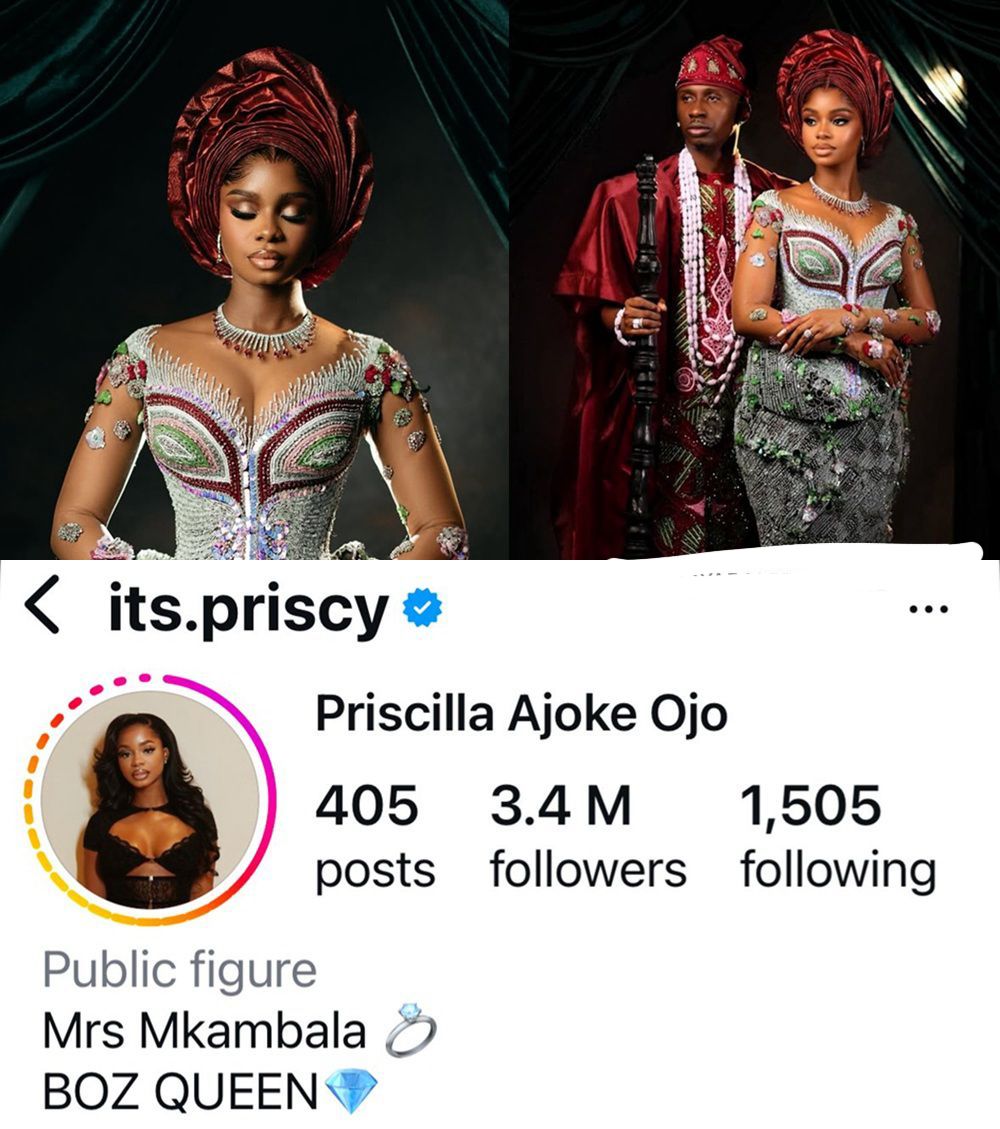
Mr Macaroni Claps Back at Tinubu Using His Own Tweets: "What Goes Around, Comes Around"

Popular Nigerian skitmaker and activist, Mr Macaroni, has stirred the social media pot once again—this time by throwing President Bola Ahmed Tinubu’s old tweets back at him in what has quickly become a trending online showdown. In a bold and unapologetic move, Mr Macaroni mirrored some of Tinubu’s decade-old criticisms of former President Goodluck Jonathan, rewording them to reflect the current realities under Tinubu’s administration. The result? A viral storm that has Nigerians debating everything from hypocrisy in politics to the cyclical nature of leadership failure in the country.
It all began when Mr Macaroni—known not only for his comedic brilliance but also his strong political voice—responded directly to tweets that Tinubu had made years ago while in opposition. In 2014, Tinubu had tweeted that “the entire nation has lost its trust in the ruling party, PDP,” describing it as a “challenging time” for Nigerians. Fast forward to 2025, Mr Macaroni reshared those exact sentiments, but with a twist: “The entire nation has lost its trust in the ruling party, APC,” he tweeted, substituting PDP for APC, which is currently led by Tinubu. The timing and the uncanny resemblance of the phrasing were impossible to ignore, and within minutes, the post began circulating like wildfire.
But that was just the opening jab. The real punch came when Mr Macaroni quoted another tweet from Tinubu, originally aimed at Jonathan, which condemned the killing of Christian worshippers and questioned Jonathan's ability to lead. Back then, Tinubu had posted: “The slithering of Christian worshippers is strongly condemnable. It calls to question the competence of Jonathan to protect Nigerians.” Mr Macaroni did not hold back in echoing those very words, substituting Tinubu’s name for Jonathan’s: “The slaughtering of Christian worshippers is strongly condemnable. It calls to question the competence of Tinubu to protect Nigerians.”
In yet another tweet from 2014, Tinubu had lamented the state of insecurity in Nigeria, writing: “Nigeria’s security situation is precarious. Nigerians are tired of excuses and explanations. They want protection for their lives and property.” Once again, Mr Macaroni held up the mirror, tweeting the exact same words to spotlight what he and many other Nigerians see as a disappointing continuation of the same problems, now under a different party.
What makes this public sparring so compelling is the undeniable accuracy of the symmetry. Tinubu, once a fierce critic of the PDP and a prominent figure in the opposition, now finds his own words being used to question his government’s ability to tackle insecurity, economic instability, and national discontent. Mr Macaroni’s tweets weren’t just an act of defiance—they were a carefully crafted statement on the state of the nation and the ironies that come with being in power.
Nigerians on social media have had a field day with the comparisons. Some praised Mr Macaroni for having the courage to say what many feel but are too afraid to voice, especially in a political climate that has been increasingly intolerant of criticism. Others called it a “digital protest,” noting that in a time where physical demonstrations are often shut down, online activism is becoming one of the few avenues for public resistance.
Critics of the administration also used the moment to highlight how insecurity, inflation, and poverty have worsened in recent years. Many pointed out that if Tinubu could hold Jonathan to such high standards back then, it is only fair that Nigerians now hold him accountable using the same yardstick. Others, however, argued that Mr Macaroni was being disrespectful or that the comparison lacked context, given the different complexities faced by each administration.
Regardless of where one stands politically, what cannot be denied is the impact of Mr Macaroni’s tweets. They have reignited important conversations about accountability, consistency, and leadership in Nigeria. The tweets have also served as a sobering reminder of how easy it is for politicians to forget the promises and criticisms they once hurled at their predecessors when they find themselves in power.
Interestingly, this is not the first time Mr Macaroni has taken on the government. From joining the #EndSARS protests to speaking out against police brutality, electoral violence, and governance failures, he has consistently used his platform to challenge the status quo. His fearless stance has earned him both admiration and backlash, but he has remained undeterred.
What this latest episode reveals is not just a comedian poking fun at politicians. It’s a citizen demanding accountability in the most creative and impactful way. By using Tinubu’s own words against him, Mr Macaroni reminds the Nigerian people—and the government—that history has a way of repeating itself. That tweets don’t die. That the internet never forgets.
As Nigerians continue to navigate a tough economic climate, worsening insecurity, and a growing distrust in government institutions, the message in Mr Macaroni’s tweets resonates deeply. They are not merely throwbacks—they are a call to action. A demand for leadership that is not only vocal in opposition but also effective in governance.
And while President Tinubu has yet to respond directly to the skitmaker’s jabs, the conversation they’ve sparked is already having a ripple effect. Political analysts, social commentators, and everyday citizens are now re-evaluating old promises, questioning current realities, and wondering whether the nation’s leaders ever truly change—or if they simply change sides.
For now, Mr Macaroni has won the internet. But more importantly, he’s made a point that echoes far beyond the likes and retweets: the people are watching, the people remember, and the people are talking.


